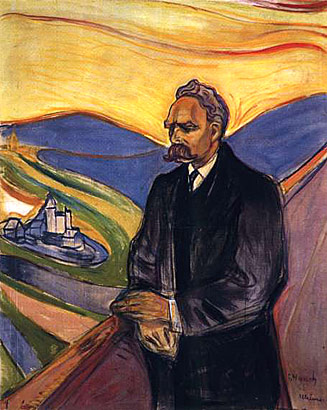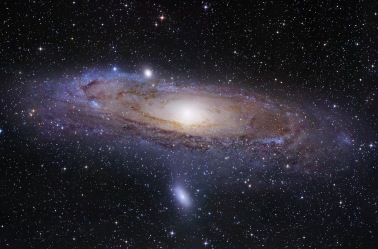Once upon a time, in some out of the way corner of that universe which is dispersed into numberless twinkling solar systems, there was a star upon which clever beasts invented knowing. That was the most arrogant and mendacious minute of “world history,” but nevertheless, it was only a minute. After nature had drawn a few breaths, the star cooled and congealed, and the clever beasts had to die. One might invent such a fable, and yet he still would not have adequately illustrated how miserable, how shadowy and transient, how aimless and arbitrary the human intellect looks within nature. There were eternities during which it did not exist. And when it is all over with the human intellect, nothing will have happened.
The pride connected with knowing and sensing lies like a blinding fog over the eyes and senses of men, thus deceiving them concerning the value of existence. For this pride contains within itself the most flattering estimation of the value of knowing. Deception is the most general effect of such pride, but even its most particular effects contain within themselves something of the same deceitful character.
Deception, flattering, lying, deluding, talking behind the back, putting up a false front, living in borrowed splendor, wearing a mask, hiding behind convention, playing a role for others and for oneself — in short, a continuous fluttering around the solitary flame of vanity — is so much the rule and the law among men that there is almost nothing which is less comprehensible than how an honest and pure drive for truth could have arisen among them. They are deeply immersed in illusions and in dream images; their eyes merely glide over the surface of things and see “forms.”
We believe that we know something about the things themselves when we speak of trees, colors, snow, and flowers; and yet we possess nothing but metaphors for things — metaphors which correspond in no way to the original entities.
If one notices how some individuals know how to treat their experiences (their insignificant everyday experiences) so that these become a plot of ground that bears fruit three times a year; while others (and how many of them!) are driven through the waves of the most exciting turns of fate, of the most varied currents of their time or nation, and yet always stay lightly on the surface, like cork: then one is finally tempted to divide mankind into a minority (minimality) of those people who know how to make much out of little and a majority of those who know how to make a little out of much; indeed, one meets those perverse wizards who, instead of creating the world out of nothing, create nothing out of the world.
Even the most beautiful scenery is no longer assured of our love after we have lived in it for three months, and some distant coast attracts our avarice: possessions are generally diminished by possession…
To find everything profound — that is an inconvenient trait. It makes one strain one’s eyes all the time, and in the end one finds more than one might have wished.
The most perfidious way of harming a cause consists of defending it deliberately with faulty arguments.
For believe me! — the secret for harvesting from existence the greatest fruitfulness and the greatest enjoyment is: to live dangerously! Build your cities on the slopes of Vesuvius! Send your ships into uncharted seas! Live at war with your peers and yourselves! Be robbers and conquerors as long as you cannot be rulers and possessors, you seekers of knowledge! Soon the age will be past when you could be content to live hidden in forests like shy deer! At long last the search for knowledge will reach out for its due: — it will want to rule and possess, and you with it!
We want to be poets of our life — first of all in the smallest most everyday matters.
We simply do not consider it desirable that a realm of justice and concord should be established on earth (because it would certainly be the realm of the deepest leveling and chinoiserie); we are delighted with all who love, as we do, danger, war, and adventures, who refuse to compromise, to be captured, reconciled, and castrated; we count ourselves among conquerors; we think about the necessity for new orders, also for a new slavery — for every strengthening and enhancement of the human type also involves a new kind of enslavement.
You great star, what would your happiness be had you not those for whom you shine?
I tell you: one must have chaos within oneself, to give birth to a dancing star.
Brave, unconcerned, mocking, violent–thus wisdom wants us: she is a woman, and loves only a warrior.
When power becomes gracious and descends into the visible — such descent I call beauty. And there is nobody from whom I want beauty as much as from you who are powerful: let your kindness be your final self-conquest. Of all evil I deem you capable: therefore I want the good from you. Verily, I have often laughed at the weaklings who thought themselves good because they had no claws.
It is the stillest words that bring on the storm. Thoughts that come on doves’ feet guide the world.
That every will must consider every other will its equal — would be a principle hostile to life, an agent of the dissolution and destruction of man, an attempt to assassinate the future of man, a sign of weariness, a secret path to nothingness.
Without music, life would be a mistake.
My conception of freedom. — The value of a thing sometimes does not lie in that which one attains by it, but in what one pays for it — what it costs us. I give an example. Liberal institutions cease to be liberal as soon as they are attained: later on, there are no worse and no more thorough injurers of freedom than liberal institutions. One knows, indeed, what their ways bring: they undermine the will to power; they level mountain and valley, and call that morality; they make men small, cowardly, and hedonistic [genüsslich] — every time it is the herd animal that triumphs with them. Liberalism: in other words, herd-animalization …
We have already gone beyond whatever we have words for. In all talk there is a grain of contempt.
Against boredom even gods struggle in vain.
About-Â Friedrich Nietzsche-http://en.wikipedia.org/wiki/Friedrich_Nietzsche






nice compilation.. i started reading the unbearable lightness of being.. was finding it a little difficult to understand what he wants to say.. have you read the book?
Thanks for the kind words.Nope have not read that.Its by Milan kundera right? Have heard its good. Was just reading a few exceprts from nietzsche and Sartre the other day.Will get to proper reading some time later.